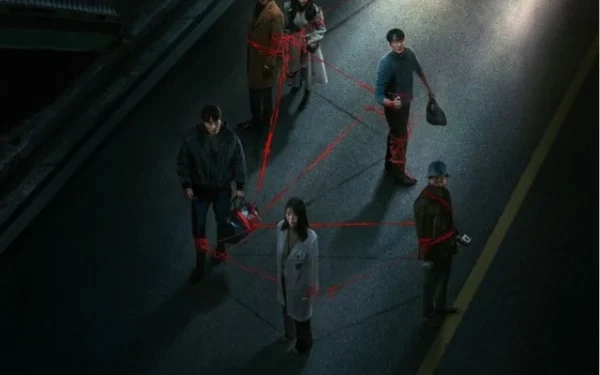Seoul, South Korea – Netflix’s latest Korean thriller, Karma, has taken the global streaming community by storm, becoming one of the most talked-about shows of 2025. Since its release, the web series has captivated audiences with its deeply woven narrative, emotional complexity, and thought-provoking twists, marking another significant milestone for K-dramas on international platforms.
A Short but Powerful Series: Only Six Episodes, Yet Unforgettable
While many Korean dramas span 12 to 20 episodes, Karma stands out with just six tightly written episodes that have delivered maximum emotional and psychological impact. The concise format, instead of limiting the storytelling, enhances its intensity. Viewers are drawn into a compact yet rich storyline that unfolds rapidly, with each episode leaving them on edge.
This unique structure has earned Karma praise for not dragging its plot—a common criticism of longer series. Instead, it has been compared to an extended cinematic experience, with every scene crafted with deliberate purpose.
Inspired by a Bestselling Novel: A Literary Foundation
‘Karma’ is based on the critically acclaimed Korean novel Ill-fated Relationship by Choi Hye-sun. The novel, known for its psychological depth and morally complex characters, explores how past decisions and traumas echo across time and generations.
Adapted for the screen by director Lee Il-hyung, the series retains much of the novel’s original emotional resonance while adding visual layers that further immerse the audience. Lee, already recognized for his mastery in suspense and emotional storytelling, uses every frame of the series to build tension and mystery.
The Plot: Six Characters, One City, Countless Secrets
Set in the hauntingly quiet fictional city of Guhoe, Karma centers on six individuals whose lives are intricately bound by a shared, shadowy past. As each character navigates their current realities—marked by loss, guilt, and longing—their interconnections gradually come to light, revealing a web of fateful encounters and life-altering decisions.
Each episode peels back the layers of the characters’ backstories, eventually converging into a shocking revelation that has left audiences reeling. The moral ambiguity of the characters—none being fully good or evil—adds to the series’ psychological intrigue.
A Star-Studded Ensemble Cast Elevates the Drama
One of Karma’s most applauded features is its powerful cast, composed of some of South Korea’s most respected and versatile actors:
- Park Hee-soo, known for his unforgettable roles in Squid Game and Time to Hunt, plays a former detective haunted by a decades-old case.
- Shin Min-ah, beloved for her work in Hometown Cha-Cha-Cha, delivers a moving performance as a woman grappling with hidden trauma.
- Lee Joon, of Gapdong and My Father is Strange fame, portrays a morally conflicted psychiatrist.
- Kim Song-hyun, a rising star in indie cinema, adds youthful energy to the cast as a rebellious student.
- Lee Kwang-soo, typically seen in comedic roles, surprises fans with his dramatic range as a grieving father.
- Gong Song-yeon, celebrated for her emotional depth in Six Flying Dragons, plays a nurse entangled in secrets from her past.
The chemistry among the actors and the strength of their individual performances has been a major driver of the show’s success.
Global Audience Reactions: Emotional and Enthusiastic
From Twitter to TikTok, Karma has become a hot topic across social media. Fans are sharing fan theories, emotional breakdowns, and praise for the show’s haunting soundtrack and narrative execution.
“Karma was both heartbreaking and comforting. You will get what you pay for—I’ve never felt it so intensely,” one fan wrote on X (formerly Twitter).
Another viewer posted:
“This show is mind-blowing. The intertwining of the characters’ stories was amazing! I haven’t cried this much since Move to Heaven.”
Themes and Symbolism: What Makes ‘Karma’ So Powerful?
At its core, Karma explores universal themes of justice, guilt, redemption, and the ripple effects of choices. The concept of karma—where actions inevitably have consequences—is not just the show’s title but its narrative heartbeat.
Throughout the series, flashbacks and metaphorical imagery are used to symbolize the emotional states of the characters. Rain often signals transformation, while mirrors and reflections suggest duality and hidden truths.
Critics have noted the drama’s ability to provoke self-reflection. “It’s not just about the characters’ karma—it makes you think about your own,” said one Korean media reviewer.
A Benchmark for Future K-Dramas
‘Karma’ is being hailed as a turning point for Korean thrillers on Netflix, proving that shorter, high-intensity series can be just as impactful—if not more—than traditional full-season K-dramas. Its cinematic quality, deep character development, and powerful performances have set a high standard for what’s to come.
This success follows the trend of Korean content dominating the streaming world, with previous hits like Squid Game, Hellbound, and The Glory paving the way. But Karma takes a more introspective, philosophical route, focusing less on gore or action and more on emotional consequences.
Director Lee Il-hyung’s Vision and Execution
Director Lee Il-hyung, known for his work on A Violent Prosecutor and A Melody to Remember, brings his signature style of emotional pacing and detailed character study to Karma. His ability to weave multiple timelines and perspectives into a cohesive story has been praised by both audiences and critics.
In a press conference, Lee said,
“I wanted viewers to feel the weight of their own actions. This show is about how even the smallest decisions can shape a lifetime.”
What’s Next for the Cast and Crew?
Following the success of Karma, many cast members have reportedly received new offers for both domestic and international projects. Netflix has not confirmed a sequel, but fans are already demanding a second season or a spin-off focusing on some of the side characters whose stories hinted at deeper layers yet to be explored.
Final Thoughts: ‘Karma’ is a Must-Watch K-Drama of 2025
With its compelling plot, richly developed characters, and philosophical undertones, Karma has secured its place as one of the top Korean dramas of 2025. Whether you’re a long-time K-drama fan or new to the genre, this six-episode psychological thriller is a must-watch.
As the global demand for Korean content continues to rise, Karma proves that powerful storytelling, when paired with talented direction and acting, can transcend cultural and linguistic boundaries. In a streaming landscape overflowing with options, Karma reminds viewers of the power of emotional depth and narrative precision.

























